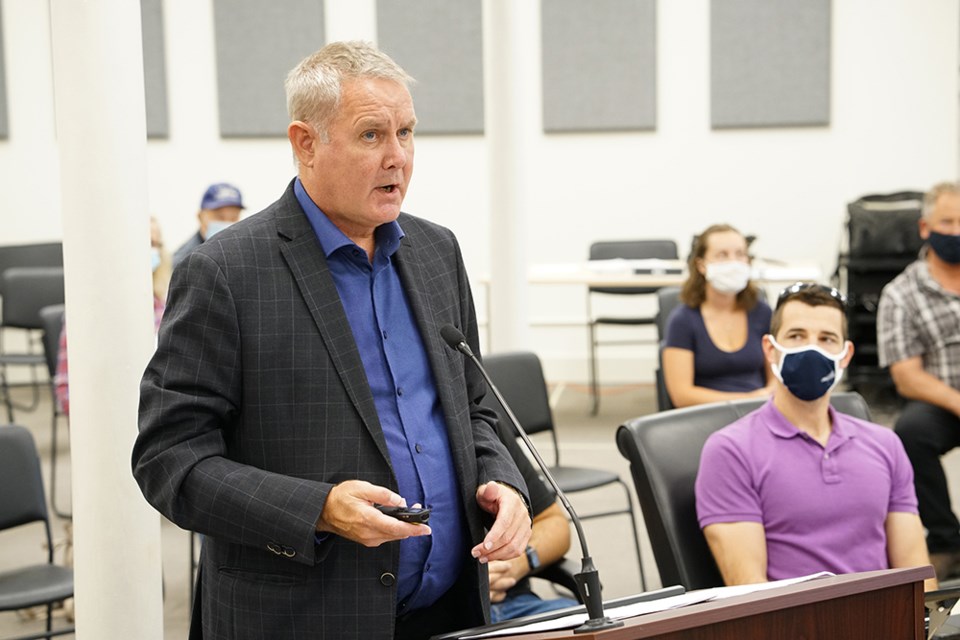An insurance industry representative outlined his concerns to City of Powell River councillors regarding a company that proposes to recover firefighting costs from insurance companies.
Dave Jevons, executive director of the Credit Union Insurance Services Association (CUISA), spoke to the city’s committee of the whole on September 21, expressing his concerns about the city’s proposal to enter into an agreement with Fire Marque.
Fire Marque is a company that recovers insurance money from policies for firefighting services for municipal governments. Fire Marque retains 30 per cent of the proceeds and allocates the remainder to the municipality in which the fire claim has been made.
“We [CUISA] are concerned about the proposed bylaws,” said Jevons.
He showed councillors a slide which indicated Fire Marque claims that insurance companies have been calculating premiums to include charges for fire department services, even though they have not had to pay out on the coverage. A second claim was that premiums won’t go up.
“I can see and fully understand why council and the fire department would want to believe these would be true,” said Jevons. “Unfortunately, they are misleading, and I’d like to try and explain why.”
Jevons said most people buy insurance policies, hoping they never have to use them. He said the insurer places the insured in a position they were in before the loss.
“The insured is no better off and no worse off,” said Jevons. “The very key thing here is that the premiums of the many pay for the losses of the few. That’s the basic fundamental of insurance.”
Jevons said insurers calculate premiums to include the cost of claims, cost of distribution, and profit. He said, for example, if $30,000 was added to the cost of a claim for recovery of fire department fees, and there was a 10 per cent cost of administration, and then 10 per cent for profit, that $36,300 will be shared by policyholders of the insurer in their premiums.
He said if there are 2,000 policy holders, that’s about $18 per policy.
Jevons said he had a conversation with the Insurance Bureau of Canada that indicated Fire Marque has no standing in any insurance contracts, so any bill will go to the homeowner. He said neither Fire Marque nor the city will know what the limits of a particular homeowners’ policy are.
“If the homeowner receives a bill for $7,500, and there are policy limits of $5,000, the homeowner will be on the hook for the other $2,500,” said Jevons.
He said the city should expect a court challenge if the Fire Marque bylaw goes ahead, which will be very expensive for the city or for its insurer, which will result in insurance rates going up.
Jevons said currently, there is what is known as a hard insurance market. He said if costs are added, insurers have no obligation to conduct business in any particular municipal region.
“If a market becomes less attractive to insurers, this could impact certain areas of insurance,” said Jevons. “Insurers may reduce exposure in that market, creating even less choice for consumers.”
Jevons said if expenses go up, premiums will go up.
“Insurers’ rating systems today are both precise and sensitive and even small impacts will affect premiums,” he added. “You don’t have to take just my word. If you ask any insurance broker, or the municipal insurance association, or the Insurance Council of BC that regulates insurance brokers, they will tell you the same thing.”
Case example
Jevons outlined a case that went before the courts where the insurer refused to pay the bill from Fire Marque and it was put on the homeowner’s property taxes.
“By law, he’s required to pay his taxes, which he did,” said Jevons. “The insurer compensated the homeowner and then they subrogated against the township and Fire Marque [to recover the funds]. It went to the court of appeal. I think it was $9,600 that the homeowner had to pay and was reimbursed, and the township and Fire Marque were each ordered to pay $5,000.”
Councillor Maggie Hathaway said that’s the one clause in the bylaw that is really bothering her and it’s her understanding that the city’s legal council is looking at it.
“It does not say that it won’t go on the homeowner’s taxes,” said Hathaway. “It says it will and so that clause is a concern for me.”
Councillor Cindy Elliott asked if there has been any comparison made between insurance rates in communities where Fire Marque operates and in communities where it doesn’t. Jevons said it is a work in progress.
Jevons, in correspondence to the city, stated that insurance company rating models are both precise and sensitive.
“If a program exists in one community that drives up claims costs, such as this one,” stated Jevons, “then that community will pay higher insurance rates compared to similar communities without it.”



